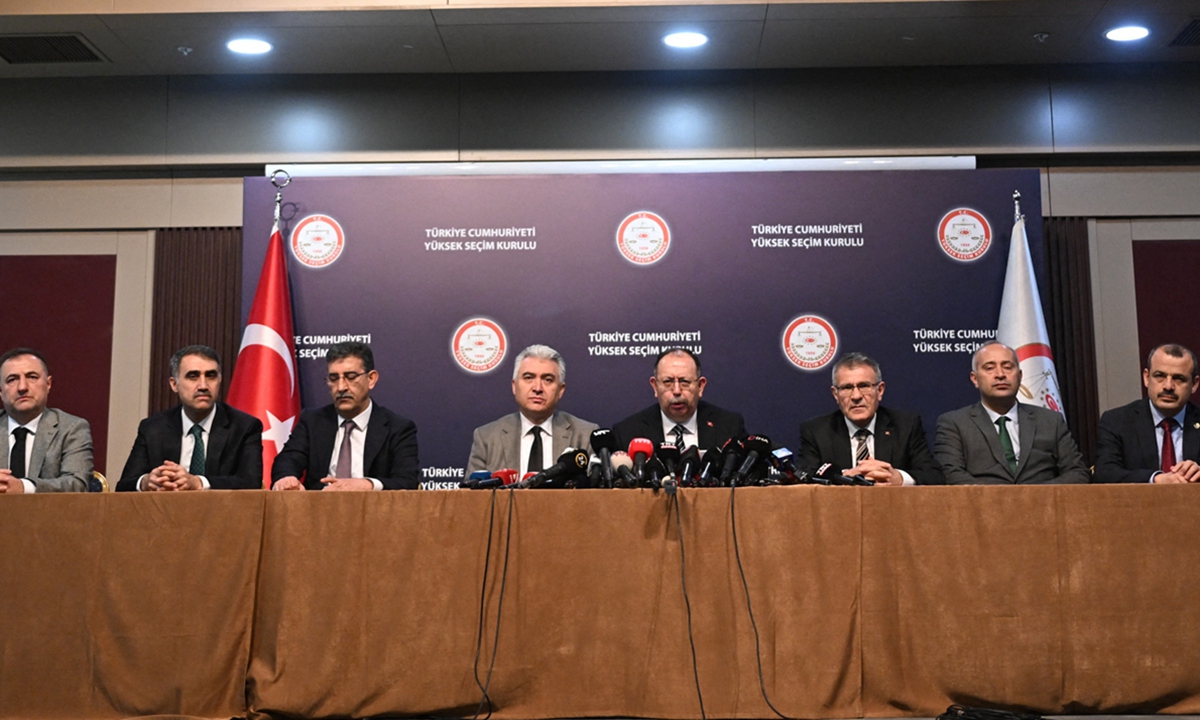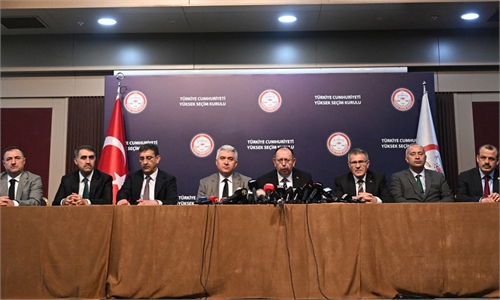Regardless of election result, structural obstacles in Turkey-US relations will likely persist

Turkish Supreme Electoral Board Head Ahmet Yener (center) speaks to press members regarding results of the May 14 presidential and parliamentary elections in Ankara, Turkiye on May 15, 2023..Photo: AFP
In the year of the 100th anniversary of its establishment, the Republic of Turkey is now experiencing one of the most important elections in its history which will likely leave prolonged institutional impacts on the future trajectory of the republic for a decade or longer.
In the election held on May 14, incumbent President Recep Tayyip Erdoğan maintained a narrow advantage over the opposition leader Kemal Kılıçdaroğlu, but both candidates were not able to receive more than 50 percent of the votes. Such a well-matched competition fully demonstrates the acute difference of opinions among various communities in Turkish society regarding the future policies of the nation, and leaves the future trajectory of Turkey still as a cliffhanger for whom it may concern.
The West seems to be particularly interested in the result of the election, and it has quite an explicit preference and expectation for the opposition to win and to redirect Turkish politics into the path that the West wishes. Though US National Security Council spokesperson John Kirby claims that the Biden administration wishes to work with "whoever the winner is," the current administration of Turkey remains strongly unconvinced. On May 13, Erdoğan reiterated Biden's public declaration in January 2020 reveling that Washington would encourage Erdoğan's opponents to win the election, and Erdoğan claimed that he is aware that Biden gave the order to topple him. Suleyman Soylu, Turkish minister of the interior, echoed his leader's narrative by arguing that the US had a history of encouraging coups in Turkey in 1960, 1971, 1980, 1998, and 2013, and by accusing the US of attempting to oust Erdoğan during this election as a revenge for the failed coup in 2016.
Though it is arguable whether these accusations can reflect the actual intention of Washington, they do provide a valuable lens for observers to understand the Turkish ruling party's perceptions of and frustration toward the West. The ruling party and current leadership of Turkey have a severe frustration toward the US because of the American role in the failed coup in 2016 and the American offer of asylum protecting those who organized that coup.
This sense of frustration has increasingly intensified in recent years in the midst of various intractable conflicts such as the European Union's constant rejection of Turkey, US sanction on Turkey for purchasing the Russian S-400 air and missile defense system, Western pressure forcing Turkey to openly confront its Russian neighbor in the Russia-Ukraine conflict, the West's aloofness toward Turkey's current financial difficulties, US exclusion of Turkey in the US-led "Summit for Democracy," disagreement between the EU and Turkey over the Cyprus issue, conflict between the US and Turkey in the Kurdish region in northern Syria, and of course Western media's quotidian delegitimization of the Turkish leadership, ruling party, and Turkish society in the name of democracy, secularism, and human rights.
These sentiments of frustration have generated a deep-rooted sense of insecurity and distrust in the mind of the ruling party and its tens of millions of voters, and in fact many Turkish citizens who voted for the opposition in this election share this sense of distrust toward the West in certain degrees too. This intrinsic fear of US intervention does widely exist in the grass roots of Turkish society, and it proudly manifests the Turkish people's demand for fair election and freedom from any foreign interventions and Orientalist judgments.
Though Western media shows a strong preference for the opposition in this election and many Western governments are wishing for a pro-West transition of power soon, an uncomfortable truth for the West is that no matter who wins the election, structural obstacles in Turkey-US relations will persist and Turkey's demand for independent foreign policy will never allow it to become Washington's faithful junior partner in the region. The current ruling party's dominance in Turkish politics in the last two decades, and the fact that almost half of the Turkish population still have chosen to support it despite current financial difficulties, all illustrate that the current establishment still remains as a force to be reckoned with even if the ruling party supposedly loses the presidential election.
If, as many in the West wish, the opposition wins the election, one should be confident that the new government will also staunchly defend the national interests of Turkey and protect her from being sacrificed for the superpower's ambition in the region. The opposition regards acquiring full membership for Turkey in the EU as one of its goals, but Kılıçdaroğlu also stressed that he wishes to enhance Turkey-China trade through Central Asia even if it "worries the West." It is also very unlikely to imagine that a new government would take the risk of openly confronting its Russian neighbor as Washington wishes, and the West will soon unsurprisingly be dragged into difficult negotiations with Ankara on the Syrian refugee issue, the country's Kurdish issue, and the Cyprus issue.
At such a historical juncture for the Republic of Turkey, only the citizens of the republic can exercise their democratic rights and determine the future of their nation, and no foreign intervention, in any forms, should be tolerated to influence or to delegitimize the election. No matter what the result will be, it is the collective will of the people of Turkey that should be respected. The West has a concerning habit of confusing the definition of "democratic" with that of "pro-West," and often delegitimizes the democratic nature of elections in the non-Western world when the local people rightfully elect those who refuse to kowtow to the West. But various examples, some of them being Iranian election in 1952, Palestinian election in 2006, Egyptian election in 2012, show that people embracing democracy in the region of West Asia never have to accept pro-Americanism, and such a lesson could be useful in the discussion regarding Turkish election today.
Approximately 100 years ago, modern Turkey's founding father Mustafa Kemal Atatürk warned his people, "No matter how rich and prosperous, a nation without independence cannot be subject to any behavior before the humanity at a higher level than serving." At another crucial cross-road of Turkish history, Atatürk's warning still rings as the alarm bell for people not only in Turkey but also the entire West Asia and North Africa region.
The author is a visiting researcher at the Center for Asian Studies, Koç University, Turkey. opinion@globaltimes.com.cn



